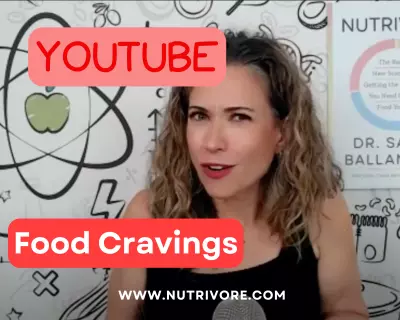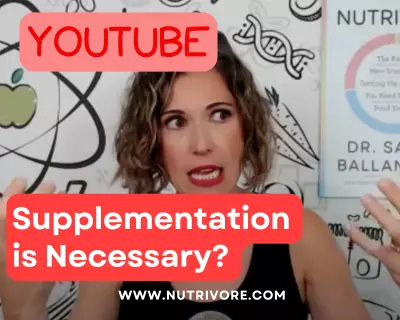Busting Hydration Myths!
Producer Potts 0:12
Okay, I need you to settle a fight for me. Is it eight cups of water per day or eight cups of any liquid per day? Like what I really want to know is does my coffee and tea count?
Dr. Sarah 0:27
Yet? Sort of? Yes. All liquids count. No, it’s not eight cups. It’s your Hang on, because I don’t remember I have to look it up. I found it. So this is where scientific consensus now is on how much liquid we need. So it is 13 cups of fluid per day for adult males, which translates to three liters or 101 ounces. And for adult females, it’s nine cups, holy smokes 74 ounces or 2.2 liters. But that includes all liquids. So that includes tea, coffee, juice, soda, comm Bucha. Like any drink. And then it also includes the water content in food. So for example, if you’re eating soup, or like a smoothie, a lot of fruits and vegetables have water content. So there’s been different analyses that kind of look at how much liquid we get from food. Americans, basically, about an average of 20% of our fluids come from food and the other 80% come from drinks. So that actually for adult females, if we need nine cups of fluid, but we’re getting 20% of that it’s about two cups then that we’re getting from food. So really, we only need seven ish cups of whatever drink we want to drink. But in other countries where the average fruit and vegetable consumption is way higher, there are some communities that will get more like half of their fluid intake from foods. So we are kind of like on the low side because we eat a lot of not vegetables. I was gonna say dry things. dry, dry, dry, like, you know, bread and crackers doesn’t have a high water content. Right.
Producer Potts 2:30
Okay, I have two follow up questions that are really important that I need answered. So first of all, I’ve heard that coffee dehydrates you, right. So like, How does my coffee count towards my liquid? Like, how does that work, then? Yeah. Are you saying like, I could just have seven cups of coffee a day? Not that I should have that much coffee a day. But I’m saying like, theoretically, like, what’s the where’s the balance point? I guess.
Dr. Sarah 2:56
So theoretically, yes. You could have seven cups of coffee per day, that would probably be too much caffeine, which is like, can can be a problem for a whole separate reason, then dehydration, right. So yeah, it’s just basically a myth that caffeinated beverages dehydrate you. So that myth was basically that caffeine acts as a diuretic, so that causes your kidneys to like, expel excess fluid from the body and so that the net would be that it dehydrates you. There’s been a couple of studies in the last few years that actually show it Nope, it’s not. That’s not what happens. Hypothetically, if you were like taking high dose caffeine pills, again, you’re gonna have way more issues from the other effects of caffeine, right? Or you have issues from that being a diuretic. So there is like a teeny tiny bit of an effect, but like in the bigger picture of hydration, it is a moot point. So yep, you can count tea and coffee towards your fluid for the day. Awesome.
Producer Potts 4:02
I love that I won the fight. So that makes me really happy. Okay, so here’s my other follow up question. We hear so much about electrolytes from like Gatorade and all that stuff. But like if we’re just drinking plain water or just drinking tea or coffee, like are we still getting electrolytes like, where does that factor in? Do we need to like, Should we be like, oh, I need to make sure I get a little Gatorade in today. Or like, how do we then do that already in just plain water? Like how does that work?
Dr. Sarah 4:32
That’s such a good question. So from if you’re drinking tap water or filtered water, like you put it through an activated charcoal filter. Most bottled water has a little bit of minerals added which are electrolytes for flavor, but that’s not enough to be like an electrolyte, like a supplement. So something like Gatorade, sports drinks, there’s a lot of powdered packets that you can add to your water to make it flavored and have a lot higher electrolytes. There’s obviously electrolyte beverages like Pedialyte, right for when you’re ill, if you’re right, the fluids, so those are all like electrolyte supplements. So there’s a lot of electrolytes in them. So what electrolytes are, are minerals that are important for electric signals in the body. So sodium, potassium, calcium, magnesium, they’re there that there are act as ions and the flow of ions is how nerve impulses travel, how muscles contract, how the heartbeats, and then there’s a lot of control of like, where water goes inside and outside of cells that uses electrolytes. And our kidneys use electrolytes to control their blood pressure. So electrolytes are very, very good. And if it’s hot, and you’re sweating a lot, or you’re working out a lot, you’re sweating a lot. Or if you’re sick and you’re throwing up or the other end, you can, you can become dehydrated, and at which point, you’re also losing electrolytes, so then replenishing electrolytes is really beneficial. But in a, like normal situation where you’re not working out in the extreme heat, you’re working out a like more modest amount. All of those minerals we also get from food, we don’t have to get them from an electrolyte beverage, we don’t have to get them from Gatorade, we can get like you’re getting sodium and potassium and calcium and magnesium from food as well. So where adding electrolytes to your water can be helpful is if you’re a person who drinks a lot, so we can actually meet like drinks a lot of just water. So we can actually mess up our electrolyte balance. By drinking too much water, we can mess up our electrolyte balance by being dehydrated. And if you’re somebody with kidney issues, your doctor may have a specific recommendation of taking this much of this kind of electrolyte don’t take this much electrolyte, that is definitely a question for your doctor. So for not like a health reason. The other place where electrolytes can be beneficial is if you’re, you know, working out outside or you’re doing really, really long workouts. We had too much fun the night before. If a lot of sweat was involved with potentially some electrolytes, the next day might be beneficial. Potentially also, like if you’re hungover electrolytes can help too because part of the symptoms of being hungover is dehydration.
Producer Potts 7:53
Yeah, well, that’s what I was referring to. I think you thought I was talking about something.
Dr. Sarah 7:57
I did think you were talking about something else. Sometimes they go hand in hand.
Producer Potts 8:00
Okay, so that means if you’re following a neutral board diet, then we don’t have to like stress as much about the eight cups of water a day, we can kind of just go with our regular liquid. And we don’t really stress about the electrolytes, because we know we’re getting a lot from the fruits and vegetables that we’re eating. So basically, we don’t have to stress about it. So can you tell everyone where they can learn more about how to adapt a neutral, poor way of eating.
Dr. Sarah 8:29
I have a really wonderful resource for everyone to use. It’s my new book called Nutrivore where the radical new science for getting the nutrients you need from the foods you eat. There is a section on hydration and very specifically the importance of hydration for kidney kidney health because our kidneys especially get upset with us when we are chronically dehydrated. But also, this book is just if I was to summarize it in one sentence, it’s like why should we even care about nutrients? That’s love that question that I’m trying to answer with this book in a way that is hopefully as fun to read as my facial expressions when you asked me about what happens if someone had too much fun last night.








